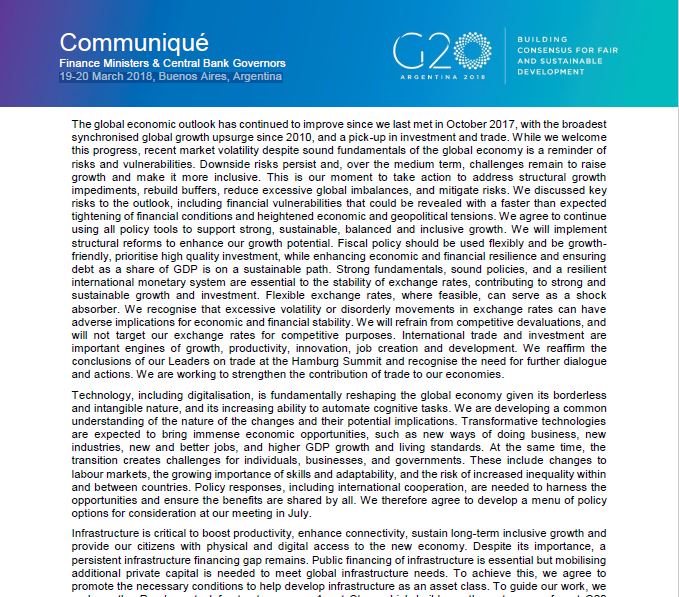Cryptocurrency market bounces back after positive G-20 cryptocurrency meeting, calls for Cryptocurrency regulation recommendations by July 2018

The cryptocurrency market received the much-awaited boost after a positive G-20 cryptocurrency meeting. The world’s economic leaders gathered in Buenos Aires, Argentina on 19-20 March 2018, for the G20 summit. The price of Bitcoin jumped above $9,000 after the positive statement from G-20.
At the end of their meeting, the G-20 issued a communique that reads in part: “We acknowledge that technological innovation, including that underlying crypto-assets, has the potential to improve the efficiency and inclusiveness of the financial system and the economy more broadly. Cryptoassets do, however, raise issues with respect to consumer and investor protection, market integrity, tax evasion, money laundering and terrorist financing. Crypto-assets lack the key attributes of sovereign currencies. At some point they could have financial stability implications. We commit to implement the FATF standards as they apply to crypto-assets, look forward to the FATF review of those standards, and call on the FATF to advance global implementation. We call on international standard-setting bodies (SSBs) to continue their monitoring of crypto-assets and their risks, according to their mandates, and assess multilateral responses as needed.”
The G-20 also agreed to develop cryptocurrency regulations and policy for consideration at the July 2018 meeting. The communique in part read: “Policy responses, including international cooperation, are needed to harness the
opportunities and ensure the benefits are shared by all. We therefore agree to develop a menu of policy options for consideration at our meeting in July.” “We ask the FSB [Financial Stability Board], in consultation with other SSBs, including CPMI and IOSCO, and FATF to report in July 2018 on their work on crypto-assets.”
The conclusion the world’s economic leaders seemingly arrived to has been expressed by FSB chief and Bank of England governor Mark Carney, who in a letter sent to G20 finance ministers argued that cryptocurrencies ”do not pose risks to global financial stability at this time.”
On crypto asset, Carney said on behalf of FSB: “Responding to the concerns of members, the FSB has undertaken a review of the financial stability risks posed by the rapid growth of crypto-assets. The FSB’s initial assessment is that crypto-assets do not pose risks to global financial stability at this time. This is in part because they are small relative to the financial system. Even at their recent peak, their combined global market value was less than 1% of global GDP. In comparison, just prior to the global financial crisis, the notional value of credit default swaps was 100% of global GDP. Their small size, and the fact that they are not substitutes for currency and with very limited use for real economy and financial transactions, has meant the linkages to the rest of the financial system are limited.”
The Financial Stability Board (FSB) is an international body that monitors and makes recommendations about the global financial system. It was established after the G20 London summit in April 2009 as a successor to the Financial Stability Forum (FSF). The Board includes all G20 major economies, FSF members, and the European Commission.


